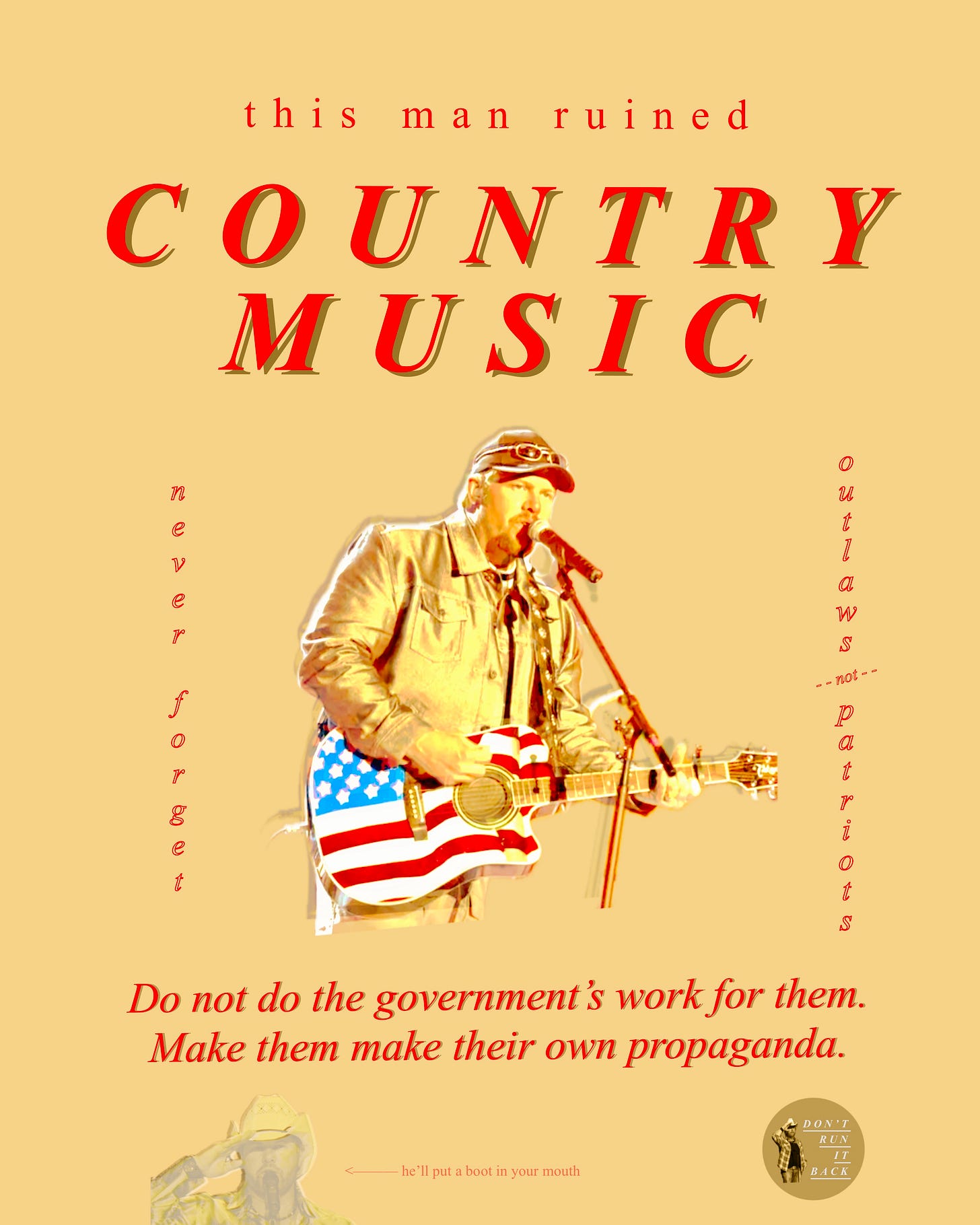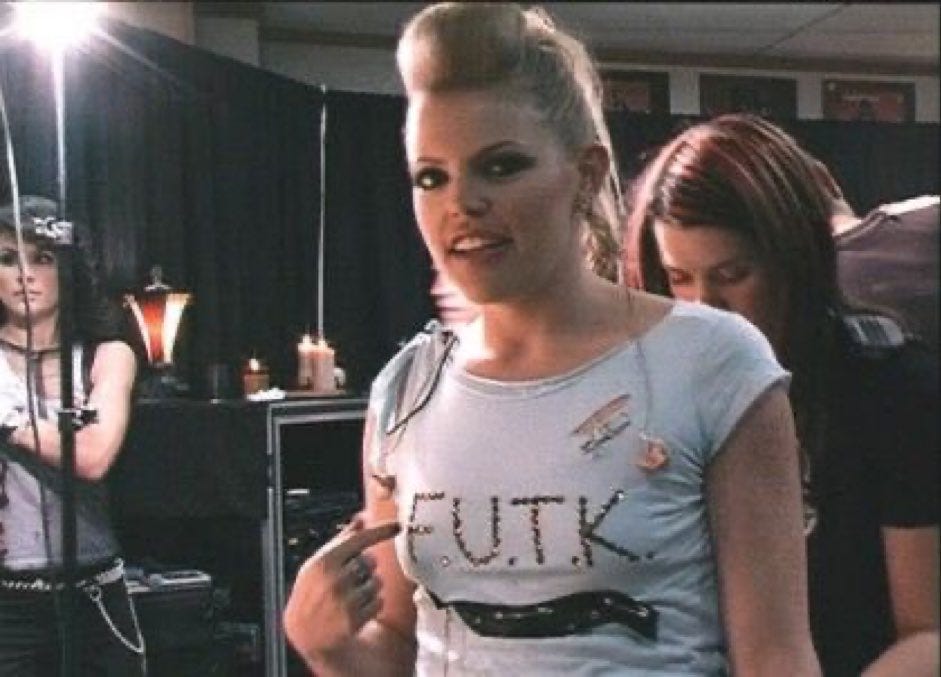We are on the precipice of perhaps the most violent chapter in the American war book since the invasion of Afghanistan and the Iraq War. Country music fans remember that time as an irreversible contraction in the genre that put the final nails in the coffin of the golden age of 90’s country as it plummeted headfirst into an abyss of patriotism and bro country. September 11th and the nationalistic fervor that consumed the years following it completed country music’s transition from songs about class to songs about whiteness, from providing a space for men to express their affections to preparing men to be soldiers, from curiosity about the world to antagonism toward it, from the live-and-let-live attitude of outlaws to the repressive authoritarianism of cops.1 In a nation that needed soldiers, country music took on the bulk of the task of recruitment, retrofitting its hillbilly histrionics to produce war propaganda.
No one was more central to that transformation than Toby Keith. (I only have so much energy to devote to much of anything right now, so I’ll let you learn more about the man for yourself if you need the whole retrospective. It’s exhausting.) An outspoken champion of the war effort, Toby didn’t shut up and sing, and his career skyrocketed. On the other side of the aisle, the Chicks took the same liberty (once), and it ended their career in its tracks. Overnight, country music became Top Gun, American Eagle, and flag-wrapped Budweiser. And Toby Keith was the head chef who freedom-fried the entire genre.
If you’ve enjoyed the return of honky tonk, the rise of alt-country, the death of graphic tee bro country, and the growing presence of autobiographical songwriters in the country scene, you should be concerned about the future of country music in a nation set on rekindling the war effort. (Of course, you should also be concerned about the actual foreign policy, but if I have to convince you of that, you’ve probably already quit reading.)
So I’m proposing a noncomprehensive list of simple commitments country musicians can make to ensure we don’t let another Toby Keith come in and put a boot up the ass of country music.
WE WILL NOT:
Spread Islamophobia. If you’re looking for ironclad evidence that the US is heavily propagandized, look no further than the ways Islam and Muslims are negatively portrayed across American media. We won’t be upholding racialized stigmas that reduce all Muslims to a handful of fundamentalist political radicals invented by foolish US foreign policy. Spreading Islamophobic rhetoric not only endangers our Muslim neighbors, it compromises a key country value of neighborliness altogether. Country life is about sharing your sugar—that includes your Muslim neighbors, babe.
Promote jingoism. In the 2000’s, Toby Keith and company created the soundtrack to the American war machine, vesting the aspirations of the powerful with the feeling and drama required to motivate ordinary folks to take up their cause. We aren’t gonna put lipstick on any government’s pig. We aren’t gonna sell anybody the lemon they’ll be putting their kids into. We aren’t gonna be the smoke machine and light show at the church of American nationalism. If the hawks want to sell us war, they will have to make their own sales pitch. No free ads.
Accept American exceptionalism. America is not terminally unique. It is a national project iterating on other Western European colonial projects. Like every other nation, it is concerned with everything from healthcare and infrastructure to foreign policy and international trade. Its electoral institutions and Constitution are not more divinely-inspired than any other nation’s. (Btw, the Bible is not about the US either.) As one nation among many, the US is subject to comparative critique. We are not the main character and will not tolerate only-child syndrome.
WE WILL:
Act like we’ve been here before. Historical amnesia is the bedrock of American political life. This amnesia obscures the ways the horrors in our headlines are only the most recent instance in a long pattern. Instead, this amnesia frames our headlines as novel departures from America’s good conscience. As first-time violations, these wrongs are easily presented as shocking mistakes, errors, or deviations that can be corrected with good-faith conversation and civic engagement—we simply have to return to the imagined progressive core of the American political project. Developing awareness of the tradition of America’s wrongs as well as the history of people’s resistance to these patterns of abuse is a vital inoculation against nationalist propaganda. Locating ourselves and the US in its historical context helps us cultivate suspicion of authority, clarity about the moral stakes, and wisdom about how to move forward.
Build a culture of the people rather than the powerful. One of patriotism’s greatest deceits is the conflation of people and place with the government that rules them. Being born on a specific piece of land, speaking a certain language, or inheriting a particular culture does not necessitate loyalty to the governors, bosses, legislators, cops, and presidents who dominate them. Nationalist propaganda does an awful lot of work trying to collapse the difference between being in the US and being of its governing institutions. To counter the slippage between person and patriot, artists have to demonstrate the significance of things that are more deserving of our loyalty: kin (chosen or otherwise), the labor of caretaking, our relationship to land and growing things, the history of outlaws like the Lowry Gang or the refugees of the Great Dismal Swamp. These are all essential parts of our world that have done more to make a way for life than bombs and billionaires. Jamming the cultural machine that transmogrifies everyday people into government loyalists requires building up counter-loyalties that offer a more powerful account of where our resilience lies and whose history we really belong to.
Lean into the propaganda. The American Right has long understood it is engaged in a propaganda war. Meanwhile, much to their self-satisfaction, liberals have punted their rhetorical strategy to experts in the professional class, attempting to counter propaganda with impersonal facts and nuance. The Left, to the contrary, has understood that propaganda, in one way or another, is inevitable. Every expression has a persuasive function even when its persuasiveness is not its leading quality. No matter how we try to nuance it, we cannot ignore the ways everything has a political valence, is situated in some discourse or another, and will likely be used for someone’s interest.
If cultural spaces like country music and the evangelical church have taught us anything, it's that our shitposting matters. Even our most low-brow, everyday memes, songs, style, and entertainment provide opportunities for the kinds of cultural play that form social factions around the imaginations that play creates and the practices it helps rehearse. The patriots have been down in the cultural mud, spreading manure and petting the worms, and we have to do the same. We have to start at the pre-political cultural spaces where the building blocks that inform our moral compass and anticipate our political action are formed. We cannot expect people to change their minds (let alone actions and loyalties) without changing their feeling first. And we cannot paywall those transformative elements behind high-brow intellectualism or elitist artistic institutions. If culture is where we work out our attunement to the world, then we have to start at the flea market, not the Guggenheim. If America has taught us anything, it’s that no one is too good to make trash.
For artists, making propaganda also means moving beyond individualistic artist expressionism and seriously considering the cultural valence of our work. What dogs are we whistling in, how can our art be weaponized against right-wing cultural hegemony, and what strategies are required to gain ground in the culture war against the bosses and the bombs? The artist is not allowed to be their own intended audience. There is no room for auteurism or aloof individualism in this team effort.
There is plenty more to be said and explored, and I won’t be surprised if I end up adding additional ground rules to the above list. But this seems like a good enough list for now.
Toby Keith is dead. Let the man rest in peace. No need to resurrect him.
In my opinion, this transformation was always inevitable in a genre that worked so hard to uphold Jim Crow racial lines. However, before 9/11, country music still had some purchase with the parts of American culture that weren’t neatly aligned with the national project, namely it still had footing in a partial and disorganized class consciousness. The patriotic shift post-9/11 accelerated the erosive process of whiteness, ultimately pruning any element that could not immediately conform to the racial and patriarchal standards required to support America’s way of conducting war. Belonging to country music cultures became about allegiance to flag and the kinds of whiteness and masculinity it required rather than expressing a loose set of country values that had an ambivalent relationship to the national project.





